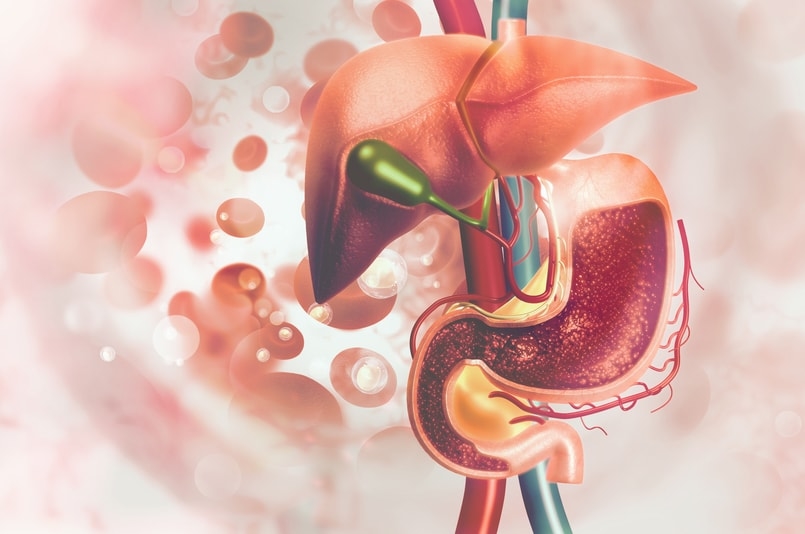The stomach is an organ in the upper portion of the esophagus. After food is chewed and swallowed, it enters the throat and chest through the food pipe called the esophagus It is responsible for digesting food and moving the nutrients along the rest of the digestive organs like the small and large intestines.

What is stomach cancer?
Stomach cancer is also known as gastric cancer. It develops when abnormal cells divide and multiply at an unusual rate to form a mass of tumor in the lining of the stomach. Stomach cancer usually does not cause early symptoms and develops over many years. On account of this it goes undetected in the early stages. It remains undiagnosed until it spreads to other parts around the stomach or in other distant body parts.
Risk factors of stomach cancer
The factors that increase the risk of developing stomach cancer are:
- Lymphoma
- H. pylori bacterial infections
- Tumors in other parts of the digestive system
- Stomach polyps
It is usually noted that stomach cancer is common among adults older than 50, men, smokers, people with a genetic history of stomach cancer, people of Asian descent (Korean and Japanese), South American or Belarusian descent.
Lifestyle factors like eating a lot of salty or processed foods, eating too much meat, having a history of alcohol abuse, not exercising or eating food that is not properly cooked or stored.
Sometimes bladder cancer is asymptomatic, asking the doctor about screening tests that can still detect cancer might be of great help for early diagnosis and treatment of bladder cancer.
Symptoms of stomach cancer
Early stage of stomach cancer is usually asymptomatic and this primarily why stomach cancer is so hard to detect in early stages. These signs and symptoms of stomach cancer can include:
a. Poor appetite
b. Unexplained weight loss
c. Abdominal pain
d. Heartburn and indigestion
e. Nausea and vomiting
f. Swelling and fluid build-up in the abdomen
g. Low RBC count (anemia)
h. A sense of fullness in the upper abdomen
i. Vague discomfort in the abdomen
Diagnostic tests to detect stomach cancer
The doctor will want to know about the patient’s medical history before he or she draws out a plan for diagnostic tests. The doctor will also want to know if any member in the family was diagnosed with a tumor of any kind. The diagnostic tests for stomach cancer are as follows:
- Blood tests
These look for signs of cancer in the body
- Upper endoscopy
Here the doctor inserts a thin, flexible tube with a small camera down the throat to examine the inside of the stomach.
- Upper GI
Upper GI series comprises of a chalky liquid called barium coating the stomach before an X-ray examination for mage clarity.
- CT scan
The CT scan is a powerful X-ray that produces detailed images of the internal body.
- Biopsy
A small piece of tissue is examined under a microscope for signs of cancer. This might also be done during an endoscopy.
Treatment for different stages of cancer
The following are treatment types for the different stages of stomach cancer
Stage 0. Stage 0 stomach cancer occurs in the inner lining of the stomach when cells with genetic mutations start to grow at an abnormally high rate. Surgery for stomach cancer is usually preferred to remove stage 0 stomach cancer. Here, the surgeon may remove part of or all of the stomach and the lymph nodes.
Stage 1. Stage 1 tumor lines the inner wall of the stomach and has spread to the lymph nodes. Just like stage 0, stage 1 is treated with surgery where removal of part of or the whole stomach is done along with nearing lymph nodes. Chemo or chemoradiation may be used before surgery to shrink tumor or after surgery to destroy any remaining cancer cells.
Read more on what is chemotherapy for stomach cancer.
Stage 2. In stage 2 of stomach cancer, the tumor has already spread from the wall of the stomach lining to deeper layers and probably to the nearby lymph nodes. In this case, chemo or chemoradiation before surgery is prescribed.
Stage 3.
Stage II. Cancer has spread into deeper layers of the stomach and maybe into nearby lymph nodes. Surgery to remove part or all of your stomach, as well as nearby lymph nodes, is still the main treatment. You’re very likely to get chemo or chemoradiation beforehand, and you might get one of them after, too.
Stage III. The cancer may now be in all layers of the stomach, as well as other organs close by, like the spleen or colon. Or, it may be smaller but reach deep into your lymph nodes.
You usually have surgery to remove your entire stomach, along with chemo or chemoradiation. This can sometimes cure it. If not, it can at least help with symptoms.
If you’re too sick for surgery, you may get chemo, radiation, or both, depending on what your body can handle.
Stage IV. In this last stage, cancer has spread far and wide to organs like the liver, lungs, or brain. It’s much harder to cure, but your doctor can help manage it and give you some relief from symptoms.
Read more on staging of stomach cancer here.
If the tumor blocks part of your GI system, you may get:
- A procedure that destroys part of the tumor with a laser on an endoscope, a thin tube that slides down your throat.
- A thin metal tube called a stent that can keep things flowing. You can get one of these between your stomach and esophagus or between your stomach and small intestine.
- Gastric bypass surgery to create a route around the tumor.
- Surgery to remove part of your stomach.
Chemo, radiation, or both may be used at this stage, too. You might also get targeted therapy. These drugs attack cancer cells, but leave healthy ones alone, which may mean fewer side effects.
How Can I Prevent Stomach Cancer?
Treat stomach infections. If you have ulcers from an H. pylori infection, get treatment. Antibiotics can kill the bacteria, and other drugs will heal the sores in the lining of your stomach to cut your risk of cancer.
Eat healthy. Get more fresh fruits and vegetables on your plate every day. They’re high in fiber and in some vitamins that can lower your cancer risk. Avoid very salty, pickled, cured, or smoked foods like hot dogs, processed lunch meats, or smoked cheeses. Keep your weight at a healthy level, too. Being overweight or obese can also raise your risk of the disease.
Don’t smoke. Your stomach cancer risk doubles if you use tobacco.
Watch aspirin or NSAID use. If you take daily aspirin to prevent heartproblems or NSAID drugs for arthritis, talk to your doctor about how these drugs might affect your stomach.
Read more on stomach cancer types.



